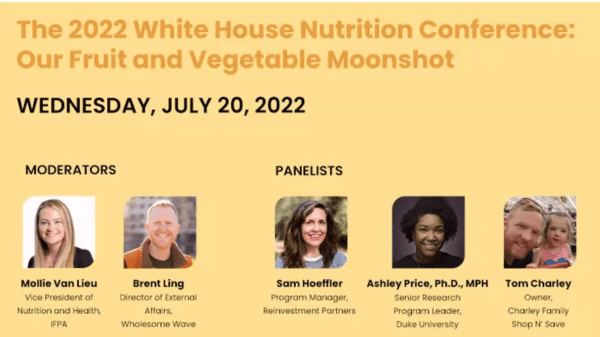Imagine leaving your doctor’s office with a little slip of paper saying, “Two pints of blueberries a day” written in the profession’s trademark scrawl.
Yet that was the subject of a Virtual Town Hall held by the International Fresh Produce Association (IFPA) BB #:378962 on Wednesday, July 20.
The idea, according to IFPA’s recent report A Fruit and Vegetable Moonshot, which was issued in preparation for the White House Conference on Hunger, Nutrition, and Health, to be held in September, is to “embed produce prescriptions as a covered benefit within the health system.”
The concept of food as medicine is hardly new, going back to the Greek physician Hippocrates in the fifth century BC. And just about everyone has had some nutritional advice (and probably scolding) from their doctor. But there is some novelty in having produce as a designated benefit in the typical healthcare plan.
Nonetheless, it is an alluring idea. Americans are currently suffering through a health crisis, the panelists observed, with 75 percent of the nation’s population overweight or obese. If high-risk individuals can be motivated to eat more fruit and vegetables, the theory goes, the less likely they are to have to go to the hospital—making the produce option tempting for insurers.
Another benefit would be increasing individuals’ purchasing power, especially for poor (or food-insecure, to use the latest jargon) people. One pilot program issues $40 a month for fruits and vegetables.
Starting with a $500,000 grant in 2018, the idea has been tested on a relatively small scale—statewide in North Carolina, for example—with good results. Under this program, participants can now obtain fruits and vegetables under (fresh, frozen, or canned) in any one of 500 Food Lion stores that operate across the state.
How would such a proposal work? Some versions employ a prepaid debit card. One panel participant, whose family owns three Shop ’n’ Save markets in western Pennsylvania, does it through the store’s loyalty program. Vouchers are another option.
It would be a high priority for any such program to impose as little of a burden on retailers as possible.
Of course, it would be easier to implement across the board in giant chains like Walmart. It’s a little trickier when it comes to independent grocers, not to mention the guy with a fruit stand on the corner.
Certain obstacles remain. The program would need to prevent fraud, since as one participant pointed out, as it would be unfortunate if it got the most publicity as a result of abuses (like the Supplementary Nutritional Assistance Program, or SNAP).
IFPA spokespeople seemed to think that this option is the most promising of those proposed in Operation Moonshot, although the paper recommends embedding a dedicated fruit and vegetable benefit into SNAP as well.
Panelists were enthusiastic about the possibilities of a prescription produce program. Although it faces many hurdles and is a long way from large-scale implementation, it is a sign of creative thinking in the produce industry—and that may be the most cheering sign of all.



